On the 27th October, 1974 the young Aberdeen band 'Rainbow' had their first practice together. One week later saw their first gig at Keith. The original line up consisted of:
George Gibson - Lead vocals, electric mandolin and violin
Dave Taylor - Lead guitar and vocals
Graeme Murray - Bass guitar and vocals
Mike Stobbie - Organ
Colin Rae - Drums
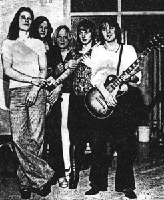
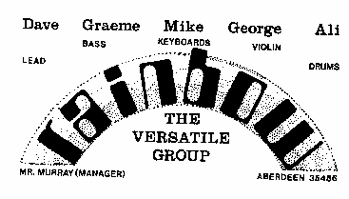
This short lived line up was soon to change
with Ali Milne taking over the drum
sticks,
Brian Wood
taking over the microphone and Dave Holt taking
over the guitar. Not long after,
Derek Forman
assumed the drumming position and
Craig Anderson
took over the front man's job by early
1977.
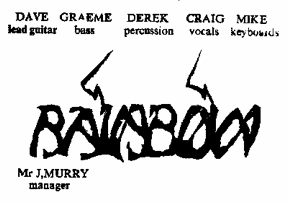
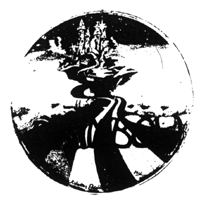
The band were forced to change their name at
this time due to Ritchie Blackmore forming
his
"Rainbow".
For one reason or another,
PALLAS
was the name of choice, and the first
PALLAS
line up comprised:
Craig
Anderson - Lead vocals and
tambourine
Dave
Holt - Guitar, Synthesised guitar,
vocals
Graeme
Murray - Bass, Bass/12 string twin-neck,
vocals
Derek
Forman - Drums, Percussion, Tubular
Bells
Mike
Stobbie - Hammond organ, ARP, Odyssey, Crumar
Multiman
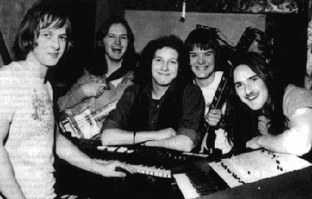
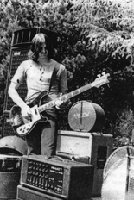
This line up supported many bands at Aberdeen
University including Thin Lizzy, The Damned,
Slik, Kevin Coyne, Shakin Stevens etc. The band
also wrote many pieces of music, which were
written in the same style as Yes and Genesis,
who were still to reach the pinnacle of their
success.Many locals considered that these
likely lads were on the verge of similar
success.
However,
1977 was famous/infamous for the PUNK
REVOLUTION!!! A movement which was to kill
stone dead many a proficient young band, and in
all honesty, probably lead to bands such as Yes
and Genesis becoming "mega buck dinosaurs",
their young natural successors having being
driven underground.PALLAS
weren't wiped out by the Sex Pistols phenomena,
but entered a slightly dubious phase of their
development with a change in style to what was
termed "Symphonic Punk".This was a fusion of
the musical proficiency and standards of the
"old wave" with the pace and agression of the
"new wave". As the band's late '77 publicity so
graphically puts it:-
"Their
new adventurous approach to music led to a
genetic mutation of old ans new wave music in
the form of a cynical futuristic 1984 (!)
setting. Their menacing Thought Police
appearance on stage smacks of new wave, 2nd
generation Rock Music minus obligatory safety
pins. Their music, driving energetic, at times
overpowering, is structured with the skill and
cleverness of the old wave and has been
described as "Symphonic
Punk"".
The
height of this period came on 16 December 1977
when the band recorded the first piece of
plastic to bear the name
PALLAS. "The PALLAS
EP"
was recorded at Craighall Studios, Edinburgh.
The tracks comprised
"Reds under the Beds", "Wilmot", "Thought
Police" and "C.U.U.K."
This must be a true collectors item, only 700
being sold and many became ashtrays in their
old age. The EP was released in February 1978.
For the next few months the lads went around
Scotland, causing consternation among some
University social secretaries with their
'neo-nazi 'image.
Though
some aspects of this period may be embarrasing
to the band now, it probably resulted in the
continuing drive of
PALLAS
music since that phase.
More
crucial in the formation of the
"PALLAS
Sound" were the line up changes in 1978 and
1979. Guitarist
Dave Holt's
limitations led to the band auditioning for a
new guitarist. Amongst those apporoached
was
Niall Mathewson,
whose own band
"Pryer"
had recently disbanded. In June 1978, Niall
played his first gig with
PALLAS,
with the minimum of rehearsal. This was to be
the pattern for
Euan
and
Ronnie
too. Niall joining the band marked a change of
musical direction, towards a much more guitar
orientated variety of "Symphonic Rock", the
"Thought Police" image being abandoned.
Interesting to note at this time,
PALLAS
were mixing their own self penned numbers with
covers of "Burn", "Smoke On The Water", "Won't
Get Fooled Again", and
"Squonk".
Following
increasingly deteriorating relationships within
the band, singer
Craig Anderson
departed, in fact not turning up to a gig.
Craig had started exploring theatrics, and the
band were eager to pursue this track. Local
band
Balrog
were renowned for their frontman
Euan Lowson,
hailing from Dumbarton. He was approached, and
within a week, his first
PALLAS
appearance was at the Cuinzie Neuk in Kinghorn,
Fife October 1978.
His
audition comprised of "Bohemian Rhapsody", and
"Child in Time". At a later date, he pointed
out that he had been auditioned by Graeme
before Craig joined.
For
the next year,
PALLAS
made their name in Scotland, adopting a second
home at the legendary Dial Inn in Glasgow where
their famous rendition of
"Suppers Ready"
became an increasing millstone around their
necks! The music biz was pricking up its ears,
but no-one would commit to anything so
unfashionable. At this time of increasing
populaity and potential, founder member
keyboards player
Mike Stobbie
departed to join a local pop/rock band in
September 1979. Good keyboards players were
hard to come by and the remaining four members
set to rehearsing as a fourpiece,
writing
"Five to Four"
(about the band - understand now!)
"Guess Who" "When The World Stood Still"
"Procession"
until a chance conversation with Derek
landed
Ronnie Brown
in the Keyboard seat, recruited from a local
Funk/Soul band.
As
usual, Ron was thrown in at the deep end, and
with the minimum of rehearsal the band played
in the Aberdeen Musicians Union contest in
December 1979. Ron's joining was the last line
up change for a long time and marked the
begining of a long uphill slog. It is a tribute
to the stability and strength of
PALLAS
that they weathered the difficult times until
July 1983 when the EMI deal was
secured.
With
the dawn of the eighties,
PALLAS
consolidated their growing success in Scotland.
The early months of 1980 were spent
writing/rewriting material with Ronnie. The
"Radio Silence" tour of Scotland in
February/March 1980 featured
"Five To Four" "Flashpoint" "Radio Silence",
"Queen Of The Deep" "Playground" "The
Interview,
with "The
Knife/Los Endos"
and
"Echoes"
as covers.
During
the summer months , the band had the use of an
old church hall which enabled them to practice
whenever they could, and a cohesive
PALLAS
style was established with the writing
of
"Crown of Thorns", "The Ripper"
with it's highly controversial theme,
and
"Heart Attack"
in fairly quick succession.
Armed
with these numbers, and the best of the "Radio
Silence" set,
PALLAS
stormed their strongholds, and firmly
established that there was a market for their
so called "progressive
rock".
In
November 1980, the lads played the Glasgow
Apollo in the Battle of the Bands contest.
Following from the success of the new material,
the lads organised their own finance to record
a live cassette album, entitled
"Arrive
Alive",
at the
Bungalow Bar in Paisley.
It was recorded on the top notch Radio Clyde
Mobile. 1,000 cassettes were originally
pressed, and released in June 1981, with two
further editions being made some months
later.
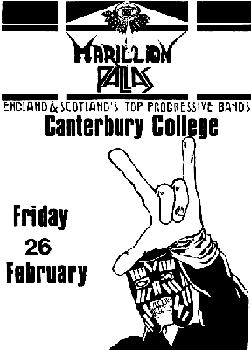
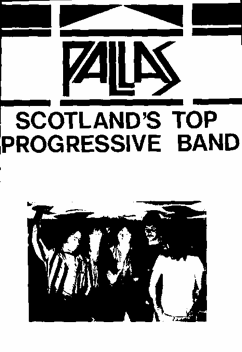
The track listing was:
Side
A 1 Five to Four
2
Queen of the Deep
3
Flashpoint
Side
B
1 Heart Attack
2
Crown of Thorns
3
The Ripper
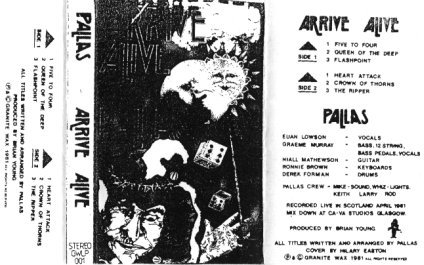
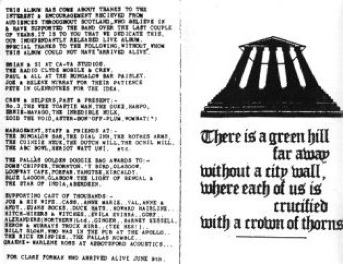
The second and third pressings contained an
additional track in the form of a demo
of
"Paris is Burning".
These original "Granite Wax" recordings with
"Paris is Burning" must be the rarest
PALLAS
recordings.
The
next move was to increase the bands following
down south. Publicist Keith Goodwin was
approached in February 1982 and the name
PALLAS
started appearing regularly in the columns of
Sounds and Kerrang. Keith persuaded the band to
release their first single for their own label
- Granite Wax - in April 1982. Confusingly
entitled
"Arrive Alive",
the track had originally been recorded as part
of a series of demos in November 1981 at
Glasgow's Ca Va studios. Having visited many
record companies with the cassette album during
late summer, it had become obvious that the
epic style of the album needed shorter tracks
to compliment it if record companies were to
become more interested in the band . To that
end, a hectic few days were spent exploring the
possibilities of singles type material. The
result was recorded in November and that two
day session proved very valuable. The four
tracks demoed were
"Arrive Alive" "Paris is Burning" "Stranger on
the Edge of Time"
and a one off "Live" take of
"The Hammer Falls".
The
band deliberately tried to show their diversity
by writing a heavy metal track, a pop-rock
track, and an "electronic" track respectively.
"The Hammer Falls" was not intended for release
or demo purposes. It was recorded for a
proposed Radio Clyde
session.
The
first mix of
"Arrive Alive"
was improved for the single . The B side was
"Stranger
on the Edge of Time",
the experimental electronic number. The demo of
"Paris is Burning" found its way onto some
pressings of the cassette album . Unfortunately
, the one off
"The Hammer Falls"
found its way onto vinyl at a later date
without being overdubbed and re-
mixed.
Following
the association with Keith
Goodwin,
PALLAS
arranged their first English dates in February
'82, including Leicester Electric Theatre
before an audience of four "new romantics" due
to a billing cock-up! At this time
Marillion
had recently released their fist cassette album
and the Scottish connection of
Fish
being their singer prompted Mike B to contact
them, as a result the band supported them at
the Starlight Club for their first London gig
and in turn helped organise
Marillion's
first Scottish tour in April and May
.
Immediately
after these dates, "Vic" the faithful tour bus,
crashed through a wall at the Sunderland
Mayfair, demolishing the plumbing system and
closing the venue for the night! All that was
damaged on the bus was the now missing front
windscreen, and the passengers had to travel
overnight to Glasgow's Diall Inn for their
first national interview in Sounds magazine in
a gale!
Six
months later (!) the feature hit the streets on
the same day as the band played the first of
many gigs at the prestigious Marquee Club in
Soho, London, September 22nd 1982. These
regular 1000 mile round trips marked the
transition from Scottish Hopefuls to National
Status, albeit at the bottom of the ladder.
From then on the band recieved numerous reviews
and ever increasing interest from a gaggle of
record company A & R men.By the 2nd &
3rd gigs at the Marquee, the guest list read
like an A & R man's convention.
Unfortunately, the most important gig to date
suffered from technical problems with the venue
PA system, and though the band received a
refund this couldn't make up for the bad
impression given to the record companies.
However a manager , Harry Maloney, showed an
interest in the band and took them on at the
end of the year.
By
the start of 1983, the demand for
PALLAS
material was such that the
"Arrive Alive "
album was re-released in an abridged form on
vinyl. For unexplained reasons the inferior
first mix of the track
Arrive Alive
was included instead of the approved single
mix.
The
album graced the "Heavy Metal" charts for many
months and sold a respectable 10,000
copies.
The
running order was :
Side
A
1 Arrive Alive
2
Heart Attack
3
Queen of the Deep
Side
B
1 Crown of Thorns
2
The Ripper
SEE
SIDE BAR FOR LINKS TO THIS AND SUBSEQUENT
ALBUMS TO FOLLOW THE STORY!

